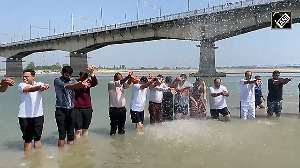Shalini loves to watch a just-premiered Hollywood movie, listens to the latest English music and sifts through volumes of restricted data, and even copies and distributes them to her friends from the comfort of her Mumbai residence.
She is not a geek, but a teenager and knowingly logs on to what is termed a "hub" using a normal Internet connection.
The entertainment industry is not amused by her activities, neither is the IT sector since it has given rise to a new breed of e-criminals (piracy is a crime according to the Indian Cyber Act 2000).
Moreover, system administrators abhor her existence since her downloading clogs their corporate networks, weakens their firewalls besides disseminating unregulated content.
Welcome to world of DC++ which teenagers are using as the underworld of cyberspace. DC++ is a free, open-source, peer-to-peer file-sharing client, that can be used to connect to the Direct Connect network. It has been developed primarily by Jacek Sieka, nicknamed arnetheduck.
There are similar hubs across the world and they use peer-to-peer software (mainly open source) like SolarSeek, FrostWire and LimeWire. However, while figures are hard to come by, most of the hubs in India and abroad are believed to be using DC++.
Peer-to-peer networking refers to communicating with different computers on a network.
The files are either stored on the network or users' hard disk, and it works much like grid computing. The hubs provide a download speed of up to 1 GB, much higher compared with a 64 kbps connection, where the speed could be around 15-20 kpbs. A movie can be downloaded from the hub in around 60-90 minutes.
A rough estimate says there would be around 1,000 hubs or so in India itself, with 20-25 hubs in each metros.
"The industry is aware of its existence. There are a lot of people logging on to such hubs and downloading files, using peer-to-peer technologies," said Vijay Mukhi, a pioneer of Internet in India.
Mukhi, also the president of Federation for Internet Security and Technology (FIST), adds that "bootlegging on the Net is becoming bolder as people know that cyber laws are not strong enough to nail them. Sadly, it's the film industry that becomes an easy prey. While piracy will kill the film industry, these hubs result in creating a new breed of e-criminals. The industry has to act immediately to stop this."
A Chief Technology Officer with a leading IT firm said on condition of anonymity that hubs are set up by the Internet Service Providers. These have Internet protocol addresses, which are provided to people by word of mouth. The users have to download a program file (.exe) to begin using the hub.
Internet Service Providers' Association of India (ISPAI) founder and board member Amitabh Singhal opines: "The recent hub culture is a part of Internet's evolvement, which is a place for a lot of innovations and possibilities. The DC++ suite and hubs are not illegal, but like every technology it can also be misused. It's impossible to monitor every user (ISPs are responsible as per the IT Act 2000 for content that passes through their networks)."
Not a single ISP responded to email questions sent by Business Standard on this subject. A cyber crime lawyer said: "In the US, there have been instances of music companies filing piracy suits against the hubs and courts levying penalties. In India, the cyber laws have to evolve, but self-restraint is the best method to be adopted."






 © 2025
© 2025